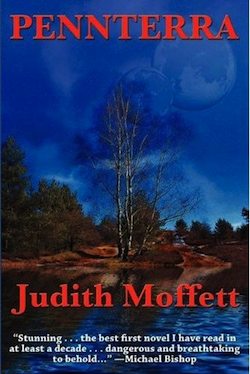Pennterra (1987) is a “wish for something different at the frontier” novel. Earth has been devastated by ecological catastrophe and has sent out missions to a potentially habitable planet in the hope of finding a new home for mankind. The advance ship contains a few hundred Quakers. When they get there, they find the world is habitable but inhabited by aliens, who ask them not to use machinery and not to live outside the one valley where they have first settled. The Quakers go along with this. The second ship to arrive contains a thousand mixed settlers who unsurprisingly don’t want to go along with this. The alien hrossa warn them that in that case, they will be destroyed by the power of the world. The new world of Pennterra is explicitly and repeatedly compared to the New World of America, but here the indigenes and their world have the power to protect themselves.
The Gaian philosophy is rather simplistic and a little annoying. What’s interesting are the aliens and the mysteries of their ecology, and the effect of the aliens on not human culture but on Danny, the boy who goes through puberty surrounded by aliens broadcasting sexual feelings. There are several point of view characters, some Quakers, some from the second ship, and one alien, but it’s Danny who carries the book and makes it worth coming back to. The other good thing about it is the prose—Moffett is just a very good writer.
No plot spoilers, and no cool alien biology spoilers.
The Quaker culture is idealised but interesting—and helped along by the broadcast empathy from the aliens. The misguided but well-intentioned people on the second mission are also interesting. The aliens are too nice, but also cool. Danny moves between worlds. He has always been isolated by being the only boy his age and by learning the alien language better than anyone else. In the course of the book, he has an alien immersion experience and then a human immersion experience (in the other settlement) and they are both alien to him, but the aliens are closer to normal.
There’s an awful lot of sex in the middle section of the book, the alien immersion section. It’s necessary, and it’s not designed to titillate, but there is a lot of it and it would put some people off reading it. I think even these days it would be too much sex for a YA, which is a pity because this is a book teenagers would really like with its questions of identity and belonging, and with their higher tolerance for simple solutions.
From sex to violence—I was right in remembering that there is absolutely minimal violence. All solutions are non-violent, not just the Quakers. The introduction, by Asimov, talks about this and makes it seem more important than it is—but as books without violence are so rare, it is worth noting. There’s plenty of conflict and excitement, but no violence. Maybe the extra sex makes up for it…
I haven’t re-read Pennterra in quite a while, maybe not since my initial completing re-read. I picked it up now because I was thinking about Moffett as a Campbell winner. She came from nowhere with “Surviving” and “The Hob” and Pennterra, and her writing was so good that she seemed like she was going to be another Delany or Le Guin. Pennterra has the flaws of a first novel—and also the flaws of somebody whose natural length is shorter. It is written in sections and with switching points of view, and each section could almost stand alone. It doesn’t really have the unity of a novel. Reading it now that was quite apparent—the different bits of it lean on each other for support, but they don’t quite make a whole.
All the same, re-reading it now I found it completely absorbing. It’s easy to sound too negative—simplistic Gaeanism, idealised Quakers, not-quite fitting pieces. But I didn’t want to put it down at all when I was reading it, even though I remembered what happened. It has splendidly complex characters with real dilemmas, especially Danny. The prose style is wonderful—Moffett is a poet and it shows. It makes you care what happens and want to get back to it.
I wish this book (odd, slightly awkward, but extremely promising) had been the beginning of a prolific and improving career. Unfortunately Moffett only wrote a handful of (brilliant) short stories and the Hefn novels, which I didn’t like as much—they had a little too much Gaean preachiness and wise aliens come to sort everything out. (Octavia Butler’s Xenogenesis books did that better, and with aliens with some complexity.)
So there you have my mixed feelings about Pennterra, for what they’re worth. It seems to be in print, so you can check it out for yourselves.
Jo Walton is a science fiction and fantasy writer. She’s published two poetry collections and nine novels, most recently Among Others, and if you liked this post you will like it. She reads a lot, and blogs about it here regularly. She comes from Wales but lives in Montreal where the food and books are more varied.










